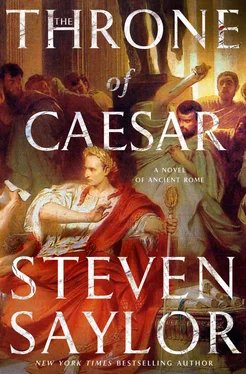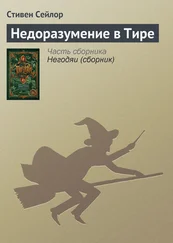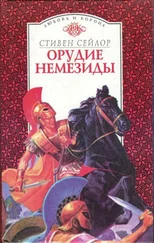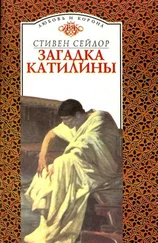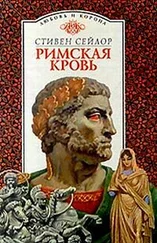Стивен Сейлор - The Throne of Caesar
Здесь есть возможность читать онлайн «Стивен Сейлор - The Throne of Caesar» весь текст электронной книги совершенно бесплатно (целиком полную версию без сокращений). В некоторых случаях можно слушать аудио, скачать через торрент в формате fb2 и присутствует краткое содержание. Год выпуска: 2018, Издательство: St. Martin's Press, Жанр: Исторический детектив, на английском языке. Описание произведения, (предисловие) а так же отзывы посетителей доступны на портале библиотеки ЛибКат.
- Название:The Throne of Caesar
- Автор:
- Издательство:St. Martin's Press
- Жанр:
- Год:2018
- ISBN:нет данных
- Рейтинг книги:5 / 5. Голосов: 1
-
Избранное:Добавить в избранное
- Отзывы:
-
Ваша оценка:
- 100
- 1
- 2
- 3
- 4
- 5
The Throne of Caesar: краткое содержание, описание и аннотация
Предлагаем к чтению аннотацию, описание, краткое содержание или предисловие (зависит от того, что написал сам автор книги «The Throne of Caesar»). Если вы не нашли необходимую информацию о книге — напишите в комментариях, мы постараемся отыскать её.
The Throne of Caesar — читать онлайн бесплатно полную книгу (весь текст) целиком
Ниже представлен текст книги, разбитый по страницам. Система сохранения места последней прочитанной страницы, позволяет с удобством читать онлайн бесплатно книгу «The Throne of Caesar», без необходимости каждый раз заново искать на чём Вы остановились. Поставьте закладку, и сможете в любой момент перейти на страницу, на которой закончили чтение.
Интервал:
Закладка:
“You heard but heard not. You saw but saw not. You know but know not, because you wish not to know.”
“What sort of rubbish is that? A poem? A riddle?” I asked—perhaps out loud, for abruptly I was wide awake.
I was not only awake, but trembling, seized by that unique sensation that comes only when one is exquisitely close to some monstrous truth. I tried to pin it down, but the impression slipped away from me; it was like trying to hold down a drop of quicksilver with a fingertip. It tantalized, that sensation of being so close but not quite knowing the truth about Cinna’s death, being on the very verge of knowing, apprehending some hint of the truth but not the truth itself, like smelling food before eating it—no, not the smell of food, but another smell … the smell of myrrh . …
When had I last smelled myrrh? At the funeral, of course … and in a dream … and at the house of Cinna when I called on Sappho. But before that, when had I last smelled it?
It was at the scene of the murder. While all the other details had become muddled in my memory, that smell remained vivid—so vivid that in recalling it I seemed to relive the very moment. Suddenly, I realized where the smell had come from. It was not from Caesar’s funeral pyre, which was quite distant, but from somewhere much closer. And it was not the smoke itself I smelled but the scent of myrrh secondhand, as if from garments permeated with the odor—from clothing . The smell had grown stronger, not fainter, as bystanders fled and the killers went about their butchery. Had it come from the clothing of the killers, then? Yes, because as they surrounded me and pressed closer together, the smell of myrrh became even stronger, almost overwhelming—and when they departed, the smell faded.…
Bothering to put on only a simple tunic—I had no time for a toga—I roused Davus and made him quickly dress, then herded him as a dog herds an ox through the house and out the front door.
“Where are we going?” he murmured, wiping sleep from his eyes.
“To the house of Cinna. Keep up!” I yelled, for I felt compelled to walk very fast.
Even before I knocked on the front door, above my own panting breath I heard the keening wail from within. I kept knocking until a slave opened the door, then pushed the slave aside and ran inside. In the room with the skylight, where the funeral had taken place, Polyxo, racked with sobs, lay prostrate on the floor.
I had come to confront Cinna’s daughter, but that would never happen. From a rope with a noose tied to the ceiling hung the lifeless body of Sappho. Directly below her on the floor was the urn that held the ashes of her father’s poems. Behind me, Davus gasped at the sight.
You saw but saw not.
What exactly had I seen when he was killed? I had seen a clawlike hand holding Cinna’s head by the hair—quite literally a claw, as I later imagined, the claw of a Fury. But it was no Fury holding Cinna’s head, nor any other divine or supernatural being. It was the hand of an ordinary mortal woman—gnarled and bony and wrinkled, to be sure, and as black as the talons of a Fury: the hand of Polyxo, the same hand that yesterday I had seen place the scroll of Orpheus and Pentheus on the funeral pyre.
The nursemaid looked up and saw me. Her face was twisted with grief, the ebony skin as gnarled and wrinkled as her hands. “I woke and found her … like this!” she wailed. “She must have done it … in the middle of the night … in that still hour … when the flame of the spirit burns low. Oh, my Sappho!”
I shivered. Had it happened at the very moment I woke in a cold sweat? Was that the instant of Sappho’s death?
“Was this her first attempt?” I asked. Unlike the thoughts raging in my head, the words I spoke were quite muted and calm.
“No. Three times before this she tried to do it. Always I stopped her. I feared, even now, even with him gone, she might try again. But last night I was so weary.… Oh, Sappho!”
“You couldn’t watch her every hour of the day and night. You’re not to blame—not for this death, anyway. Was it your idea to kill Cinna?”
Polyxo stiffened and swallowed her sobs. “No! It wasn’t I who thought of such a thing.”
“Who, then?”
“Sappho. It was she who first thought of doing it.”
“But you approved.”
“I told her it would be proper and just. I said to her, ‘Instead of killing yourself, dear child, kill the one who made you.’”
“And yet … it was Sappho who scratched that word in the sand, the Greek word for ‘beware.’ It must have been her. You didn’t write it. You know no Greek.”
“Yes, it was Sappho. In a moment of weakness … she wrote that warning. Perhaps she thought he would take heed … and stop. But he didn’t.”
I felt a chill. “You mean, he was still…”
“Yes! Right to the end. ”
“I thought perhaps it was all in the past.”
“Oh, no. It never stopped.”
I gazed at the girl’s lifeless body, swaying slightly despite the stillness of the room. “She wanted her father to die—horribly—but still she warned him.…”
“Because the poor child was split in two, don’t you see? Body and soul, torn in two—never whole. The master did that to her. A girl raped by her father can never be of one mind again. She would always love him, always want his love in return—and at the same time fear him, hate him. Even, sometimes, I think she desired him—as a wife desires a husband. As if they had truly become husband and wife. But she was his daughter, not his wife! Oh, how she hated him. But she despised herself even more. She wanted to die. She wanted him to die—but she wanted to save him.…”
“The poor girl,” I whispered.
Polyxo gazed up at Sappho’s body. She clutched the girl’s dangling ankles and sobbed.
“It was your hand I saw, Polyxo, holding up his head.”
“Yes!”
“And before that, it was your voice I heard. ‘Tear him for his bad verses, then!’”
“Yes.”
“I thought those words were a slur against Cinna’s poetry—careless, hateful words spoken by some no-nothing. But you meant exactly what you said. You meant that his verses were bad, truly bad—”
“Wicked! Impious! Evil! To write about such a thing, to dote on it, to lavish on it so much loving care—and then to do it, not once but many, many times. Yes, it was I who said those words about his verses—and it was I who tore off the hand that wrote them!”
Nausea clutched my throat. I swallowed hard. “There was another voice. The one I heard first, that said, ‘Look, there he is,’ pointing Cinna out to the killers. That wasn’t your voice. It was a hoarse, husky voice. Like scratchy wool upon the ear—no, more pleasing than that. Like raw silk. A disguised voice, pitched deliberately low, so as to pass for a man’s voice. It certainly fooled me.”
“But you know now, don’t you? You’re clever.” Polyxo flashed a bitter smile. “She’s clever, too, that one. As clever as you. As clever as any man!”
“Maybe too clever. Does she know, yet, about Sappho’s death?”
“No. No one knows outside this house.”
“Let me go to her, then. Let me be the one to tell her what’s happened—what all your secrecy and plotting and bloodshed have finally accomplished.”
* * *
With Davus beside me, I descended the Aventine and headed for the Esquiline Hill, until at last we came to the House of the Beaks.
In the forecourt outside the front door, a litter was departing. The occupant gave some signal to the bearers, for just as I was passing the litter it came to a halt. It was quite plain, with nothing to distinguish it: closed gray curtains, simple poles, no insignia.
Читать дальшеИнтервал:
Закладка:
Похожие книги на «The Throne of Caesar»
Представляем Вашему вниманию похожие книги на «The Throne of Caesar» списком для выбора. Мы отобрали схожую по названию и смыслу литературу в надежде предоставить читателям больше вариантов отыскать новые, интересные, ещё непрочитанные произведения.
Обсуждение, отзывы о книге «The Throne of Caesar» и просто собственные мнения читателей. Оставьте ваши комментарии, напишите, что Вы думаете о произведении, его смысле или главных героях. Укажите что конкретно понравилось, а что нет, и почему Вы так считаете.
